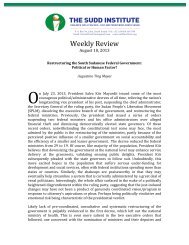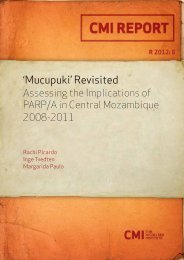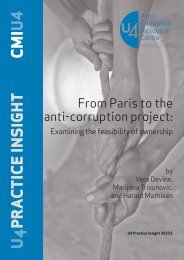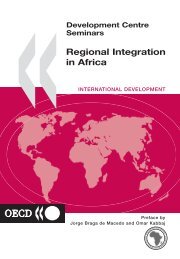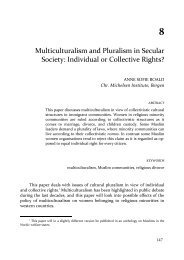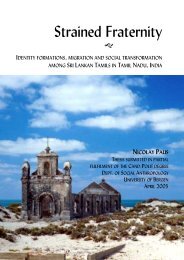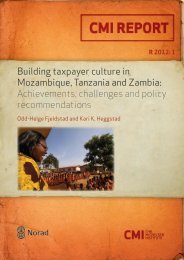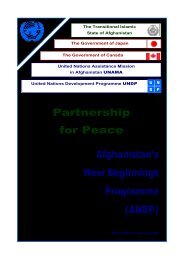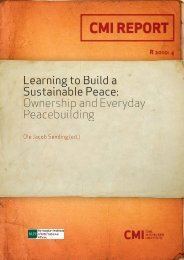Download (pdf) - CMI
Download (pdf) - CMI
Download (pdf) - CMI
Create successful ePaper yourself
Turn your PDF publications into a flip-book with our unique Google optimized e-Paper software.
<strong>CMI</strong> REPORT DECENTRALISATION AND GENDER R 2008: 9<br />
3. Case two: Misungwi District Council<br />
By Liss Schanke, Amina Lwasa, and Juliana Myeya<br />
3.1 Socio-economic situation<br />
Misungwi is one of the eight districts in Mwanza region. The district is a relatively new district,<br />
established in July 1995. By car, the district head quarters can be reached from Mwanza city in<br />
about 45 minutes. 74 percent of the Misungwi labour force are engaged in agriculture. 26 percent<br />
are employed in other areas, e.g. fishing. The district is also relatively rich in natural resources<br />
(sand, stones, mineral deposits etc.). Misungwi is one of the most populated areas in the region<br />
with a population of almost 260,000. The main ethnic group is the Sukuma who accounts for almost<br />
95 percent, while other ethnic groups include Kerewe, Jita and Ha. The water situation is critical –<br />
only one third of the district population has access to safe water.<br />
40 percent of the population of Misungwi lived below the poverty line at the turn of the millennium.<br />
There is high illiteracy rate in the communities, and little understanding about the danger of harmful<br />
traditional practises.<br />
3.2 Cooperation within the district council<br />
Decentralisation by devolution<br />
The team was informed that cooperation with the RMO is good, and that the RMO arranges<br />
meetings with the staff every 3 months. In the staff’s view, “the RMO contributes a lot.”<br />
The Misungwi District Council Strategic plan of 2006 states that the decentralisation policy has<br />
enhanced people’s participation in decision making. The plan points out the shortage of skilled staff<br />
as the main weakness. The shortage of staff is indeed serious. The personnel required according to<br />
the strategic plan are 450, while the available is 228 only. Since the finalization of the strategic plan<br />
the situation has worsened; according to the DED, only 39% of the district positions are presently<br />
filled, and there are unskilled staff in many positions. The problem to get skilled staff is due to<br />
many factors, including the following:<br />
- the general shortage of qualified staff in Tanzania<br />
- the general poverty of the area, e.g. lack of water.<br />
- the lack of staff housing<br />
It is also possible that the staff shortage will in itself make it more difficult to recruit new staff, that<br />
candidates who are aware of this will prefer other districts and that this therefore constitutes a<br />
vicious circle.<br />
The strategic plan also points to lack of opportunities for training and upgrading of skills.<br />
Shortage of skilled staff is likely to have a profound negative impact on the general district capacity<br />
for cooperation on coordination:<br />
- within the district departments<br />
- between the district departments<br />
- between the district and the councillors<br />
- between the districts and NGOs, CBOs, private sector and communities.<br />
17



